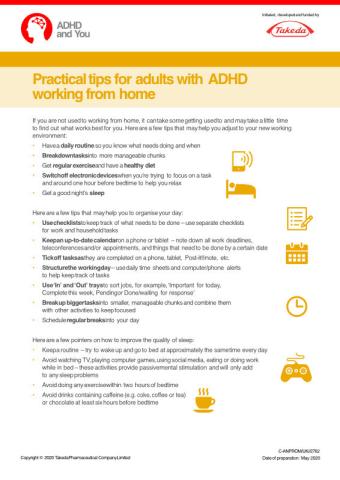What can I do to help myself?
 It may take time to find out what works best for you (and what you should avoid), but there is plenty of support and advice available. Here are a few tips that may help:
It may take time to find out what works best for you (and what you should avoid), but there is plenty of support and advice available. Here are a few tips that may help:
- Have a daily routine so you know what needs doing and when
- Breakdown tasks into more manageable chunks
- Get regular exercise and have a healthy diet
- Talk to your employer or tutor about reasonable adjustments to help you at work or college
- Switch off electronic devices when you’re trying to focus on a task and around one hour before bedtime to help you relax
- Get a good night’s sleep
 Here are a few tips that may help you to organise your day:
Here are a few tips that may help you to organise your day:
- Store important things, like keys and wallets/purses, in the same place every day
- Use checklists to keep track of what needs to be done around the house
- Keep an up-to-date calendar on a phone or tablet – note down all appointments, social arrangements and things that need to be done by a certain date
- Tick off tasks as they are completed on a phone, tablet, Post-it note®, etc.
- Structure the working day – use daily time sheets and computer/phone alerts to help keep track of tasks
- Use ‘In’ and ‘Out’ trays to sort jobs, for example, ‘Important for today’, ‘Complete this week, ‘Pending’ or ‘Done/waiting for response’
- Break up bigger tasks into smaller, manageable chunks and combine them with other activities to keep focused
Sleep problems are more common among people with ADHD.
 Here are a few pointers on how to improve the quality of sleep:
Here are a few pointers on how to improve the quality of sleep:
- Keep a routine – try to wake up and go to bed at approximately the same time every day
- Avoid watching TV, playing computer games, using social media, eating or doing work while in bed – these activities provide passive mental stimulation and will only add to any sleep problems
- Avoid doing any exercise within 2 hours of bedtime
- Avoid drinks containing caffeine (e.g. coke, coffee or tea) or chocolate at least 6 hours before bedtime
What about driving?
Adults with ADHD, especially those with symptoms of hyperactivity, are more likely to take risks.
Adults with ADHD are more likely to:
- speed
- be involved in traffic accidents
- be prone to road rage
- have their driver’s license revoked
 If you are going to drive, make sure you understand and follow the rules of the road. Always follow safe driving habits, such as observing the speed limit, wearing a seatbelt and avoiding distractions such as texting or talking on the phone. If you are with a friend, make sure you pay attention to your driving.
If you are going to drive, make sure you understand and follow the rules of the road. Always follow safe driving habits, such as observing the speed limit, wearing a seatbelt and avoiding distractions such as texting or talking on the phone. If you are with a friend, make sure you pay attention to your driving.
You must tell the Driver and Vehicle Licensing Agency (DVLA) if your ADHD affects your ability to drive safely. Ask your doctor if you’re not sure if your ADHD will affect your driving.
What about other challenges?
Children and young people with ADHD often experience problems with school and in social situations. Although symptoms may change, difficulties experienced by children with ADHD may continue into adulthood.
According to surveys, adults with ADHD are more likely to:
- be unemployed
- have been divorced
- be addicted to tobacco or report recreational drug use
However, there are steps you can take to address the challenges of ADHD.
If you have any questions or concerns, it’s a good idea to make a note of them and take them along to your next appointment with your doctor.
Resources for download
Useful Links
Patient support organisations
- ADHD Foundation – Adults – https://adhdfoundation.org.uk/
- ADHD Solutions – https://www.adhdsolutions.org/
- The National Attention Deficit Information and Support Service (ADDISS) – https://www.addiss.co.uk
- Scottish ADHD coalition – https://www.scottishadhdcoalition.org
Professional organisations
- UK Adult ADHD Network (UKAAN) – https://www.ukaan.org
- National Health Service – Overview ADHD – https://www.nhs.uk/conditions/attention-deficit-hyperactivity-disorder-adhd/
- Royal College of Psychiatrists – ADHD in adults – https://www.rcpsych.ac.uk/mental-health/problems-disorders/adhd-in-adults
- National Institute for Health and Care Excellence (NICE) guideline NG87 – Information for the public – https://www.nice.org.uk/guidance/ng87/informationforpublic
You are now leaving www.adhdandyou.co.uk. You will be re-directed to an external website. Takeda accepts no responsibilty for the content of other websites.
